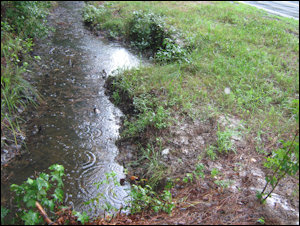
HB 1774 would give credits for projects using water from roadside drainage ditch like this one in Mathews County. Photo credit: The Ditches of Mattews County.
By Carol J. Bova
Virginia legislation usually follows a logical pattern in which bills lay out what they intend to do and the means by which their goals will be accomplished. This series looks at one bill introduced in the 2017 General Assembly session that missed the mark, morphing into a substitute bill that passed the House and Senate. The intentions behind it were honorable. The consequences, however, could be disastrous.
This is not an easy story to tell or to read. Like any mystery, only when all the pieces are laid out and examined will the background and details fit together to fill in the gaps. Even then, the final part of this story will take the next ten months to unfold.
This introduction in a series of four posts sets the stage and describes the contents of HB 1774. Part Two explores the problems in the original bill. Part Three looks at the surprising substitute bill. Part Four shows the mapping errors and assumptions that pointed lawmakers in the wrong direction.
~~~~~~~~
The requirements of last year’s stormwater management legislation, scheduled to go into effect on July 1, 2017, will be expensive and hard to incorporate into new developments in the Commonwealth. Many projects will need mitigation credits, which are scarce and in high demand.
Del. Keith Hodges, R-Urbanna, teamed up with the Virginia Coastal Policy Center of William and Mary Law School and the Executive Director of the Middle Peninsula Planning District Commission (MPPDC), Lewis Lawrence, to create legislation to alleviate the situation. MPPDC hired a consultant to assist in the work.
Under the combined banners of encouraging rural economic development, easing stormwater management requirements for new development, and creating more mitigation credits for both urban and rural projects, the team crafted HB 1774.
This plan would generate stormwater mitigation credits using new Regional Stormwater Practices (RSP) Banks. The Virginia Department of Transportation would give exclusive use of the water in its roadside ditches to an RSP bank to use in a bioretention or other BMP (Best Management Practice) to improve water quality in order to create the mitigation credits.
These credits would be applied first to Rural Development Growth ((RDG) areas along the highways adjacent to the banks, and excess credits would be sold to other developers.
Under the regulations scheduled to go into effect July 1, 2017, many rural localities chose to opt out of administering stormwater programs for new developments involving 10,000 square feet or one acre of land disturbance, and have the Department of Environmental Quality (DEQ) continue to administer the program as it had before the new legislation. (Chesapeake Bay Preservation Act areas had a lower threshold for the regulations, 2,500 square feet or one acre of land disturbance.)
Localities would receive fees to entice them into managing the new stormwater program for the RDG areas and overseeing the operation of the RSP banks. States the bill: “The fees for certain stormwater best management practices (BMPs) shall be paid directly to the locality.” From these fees, a locality would place 50 percent of the amount developers saved through the program into an account to operate the RSP bank. (Note: the bill is silent on who determines the fees or how the cost savings would be verified.)
There’s an additional provision for those localities with Chesapeake Bay Preservation areas–the State Water Control Board would authorize “any political subdivision of the Commonwealth that is located in Planning District 18 and is subject to the Chesapeake Bay Preservation Act … to designate a qualified entity to establish and administer an RSP bank.” This would include Middle Peninsula county governments, and MPPDC. If the Governor signs a related Hodges’ bill, HB 2055 which passed the House and Senate this session, the Rural Coastal Virginia Community Enhancement Authority would become a new political subdivision.
A private entity designated to operate an RSP bank would annually “return eight percent of the [mitigation] credit revenue it generates to the locality in which it is located and two percent” to DEQ.
To enable a private entity to do this, Del. Hodges introduced HB 2009 to allow administration of a stormwater management program by a certified third party. HB 2009 passed the House and Senate with ease.
To be continued in Part Two: Buzzwords and Bills–Donut Hole Defeat and a Second Chance for HB 1774
Carol Bova is author of “Drowning a County: When urban myths destroy rural drainage,” a book documenting VDOT’s neglect of its highway drainage in Mathews County.


